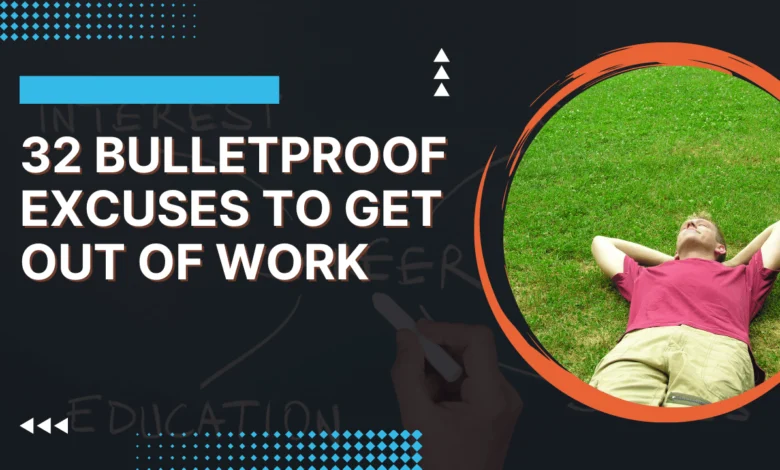Bulletproof Excuses to Get Out of Work: Smart, Believable, and Effective

Bulletproof Excuses to Get Out of Work Life happens—sometimes in ways we can’t plan for. Maybe you’re burned out, maybe you’ve got an appointment you can’t miss, or maybe you just need a breather before you break down at your desk. The truth is, we all need time off occasionally, but convincing your boss without damaging your reputation requires a little finesse. That’s where bulletproof excuses to get out of work come in handy.
In this article, we’ll explore some of the most believable, professional, Bulletproof Excuses to Get Out of Work and effective excuses you can use. Bulletproof Excuses to Get Out of Work Whether you’re calling in sick, dealing with an emergency, or just need a mental health break, these strategies will help you step away from work without raising red flags.
Why Having a Good Excuse Matters

Bulletproof Excuses to Get Out of Work to Get Out of Work Let’s face it—there’s a difference between “I don’t feel like working today” and “I need a day off because of a real issue.” Your boss, no matter how understanding, expects professionalism. Giving a vague or unbelievable excuse not only hurts your credibility but might also make future requests harder to justify. That’s why having a bulletproof excuse ready can make all the difference.
A well-thought-out excuse shows that you value your job while still needing time for personal matters. For example, calling out because you “overslept” isn’t nearly as convincing as saying you have a sudden migraine or a family emergency. Bulletproof Excuses to Get Out of Work One sounds careless; the other sounds human.
Plus, employers generally respect honesty when paired with responsibility. Bulletproof Excuses to Get Out of Work If you know you’re not going to make it to work, offering a clear, believable reason upfront helps maintain trust. The goal isn’t to lie but to communicate in a way that doesn’t harm your professional image.
The Classic Health-Related Excuses
When in doubt, health excuses are always among the safest options. Bulletproof Excuses to Get Out of Work After all, no boss wants a sick employee spreading germs around the office or showing up unproductive.
The go-to example is the “I’m not feeling well” excuse. Bulletproof Excuses to Get Out of Work You can expand this to something specific like a stomach bug, migraine, or flu symptoms. The more realistic and relatable the illness, the better. For instance, nearly everyone has experienced food poisoning at some point—saying you got hit with it suddenly is something most employers won’t question.
Another angle is mental health. Bulletproof Excuses to Get Out of Work While this used to be a taboo subject, many workplaces today recognize its importance. If you frame your excuse as needing a “mental health day” to reset, it shows maturity and awareness rather than laziness. Employers are slowly but surely respecting this as a valid reason to take time off.
Family Emergencies: The Untouchable Excuse
Few excuses carry as much weight as a family emergency. Bulletproof Excuses to Get Out of Work Whether it’s a sick child, an elderly parent needing urgent care, or an unexpected household crisis, most bosses will immediately understand and respect your need to step away.
For example, saying something like, “My child woke up sick and I need to take them to the doctor,” is straightforward and believable. Bulletproof Excuses to Get Out of Work Similarly, “I just got a call that a close relative had an emergency” is the kind of situation no one is going to challenge. These excuses tend to be bulletproof because family responsibilities are universally understood.
However, it’s important to use this excuse sparingly. Bulletproof Excuses to Get Out of Work Overusing it can make it seem suspicious. Your boss might start to wonder if your family has constant crises. When used occasionally, though, this is one of the most reliable ways to secure time off without damaging trust.
The Unexpected Household Disaster
Nothing throws a wrench in your workday like a household disaster, and most employers get that. Bulletproof Excuses to Get Out of Work Saying your water heater burst, your power is out, or your car broke down on the way to work are all highly believable and relatable.
One example is the car trouble excuse. Bulletproof Excuses to Get Out of Work If your workplace isn’t accessible without a vehicle, telling your boss that your car broke down and you’re waiting on a mechanic feels like a reasonable explanation. Adding details like “I’m waiting for a tow truck” makes it even more convincing.
Another bulletproof household excuse is an urgent repair issue, such as a plumbing leak or an electrical problem. No boss wants their employee to risk property damage or safety hazards just to show up at work. This type of excuse is particularly effective because it involves responsibilities you can’t simply ignore.
Medical Appointments and Health-Related Obligations
Another strong category of excuses revolves around medical appointments. Unlike vague sick-day excuses, medical obligations come across as scheduled, necessary, and unavoidable.
Saying you have a doctor’s appointment, dental procedure, or specialist consultation is an easy way to justify missing work. It sounds professional because it shows you’re being proactive about your health. You can frame it as something you’ve been waiting for, like, “This was the earliest appointment I could get.”
Even better, medical appointments often come with built-in flexibility. You don’t always have to take the full day—sometimes you can say you’ll be late or leave early. This makes it a considerate excuse that most employers appreciate because it shows you’re trying to minimize the impact on your work schedule.
Mental Health and Personal Well-Being Days
In today’s fast-paced work culture, mental health excuses are becoming more recognized and respected. Many companies even include mental health days in their official leave policies.
If you’re truly burned out, stressed, or just not in the right mindset to perform effectively, explaining this to your boss can go a long way. You don’t need to go into personal details—saying you need a day to “reset and recharge” often works perfectly. The key is to frame it as something that will make you more productive when you return.
In fact, more managers are starting to see mental health breaks not as excuses but as preventative measures against burnout. By presenting your need for time off in this light, you not only protect your well-being but also show you’re thinking about long-term productivity.
Less Conventional but Still Believable Excuses
Sometimes, the best bulletproof excuses are the ones people don’t use as often. These stand out because they’re less likely to trigger suspicion.
For instance, dealing with pet emergencies is surprisingly effective. Saying your dog ate something dangerous and you need to rush to the vet is both relatable and urgent. Employers who have pets will especially empathize.
Another option is unexpected delivery or contractor obligations. If you’ve scheduled an important delivery or repair service that requires your presence at home, your boss will likely understand. Just be sure to emphasize that it was the only available time slot.
Even something as simple as a broken phone or internet outage (if you work remotely) can serve as a realistic and non-questionable excuse. These modern-day issues are common enough that no one will doubt them.
Tips for Making Any Excuse Work
No matter which excuse you use, delivery matters just as much as the excuse itself. A sloppy explanation can make even the most believable excuse fall apart.
First, always keep your tone professional. Don’t sound overly apologetic or too casual. A clear, straightforward explanation goes a long way. Second, avoid giving too many unnecessary details—specifics can backfire if your story sounds rehearsed or complicated. Keep it simple and believable.
Finally, whenever possible, offer a solution. For example, if you’re missing work today, assure your boss you’ll catch up tomorrow or finish the task remotely if possible. Showing responsibility balances out the inconvenience of your absence and strengthens your credibility.
Conclusion: Excuses Done Right
Taking time off doesn’t have to feel like a battle between honesty and professionalism. With the right bulletproof excuses, you can get out of work when necessary without damaging your reputation. From health issues to family emergencies to unexpected household disasters, there are plenty of ways to step back from work in a believable and responsible way.
Remember, the key isn’t to abuse these excuses but to use them wisely when you genuinely need time away. A well-chosen excuse, delivered respectfully, ensures you get the break you need while maintaining trust with your employer. After all, everyone needs a little breathing room now and then—and the smartest employees know how to take it without burning bridges.



